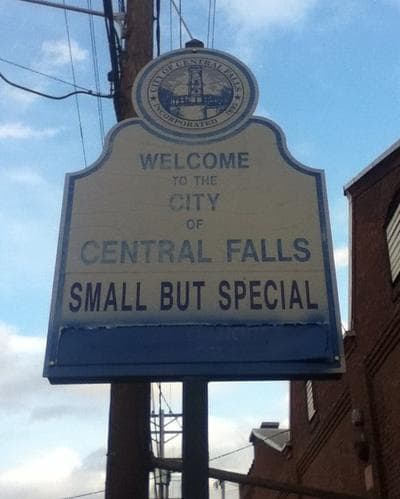Advertisement
Living In A Place No One Expects To Find You
It was 11 p.m. on the kind of steamy July evening when — even on a work night, even inside a climate-controlled apartment — summertime exhilaration overpowers, and an aimless drive must be taken. So I headed to CVS with no real purpose.
I was in Central Falls, Rhode Island, where I live with my husband. It is the poorest city in the state. When I fell in online-love with our converted mill apartment — full of 1830 brick factory character, cheaper than apartments in Providence — I was ensconced in a Manhattan office, and my husband was halfway to the ocean state for his surgical residency. I pictured Volvos, organic bakeries, and L.L. Bean totes.
“Central Falls: Small But Special” read the modest sign that welcomed us months later. The median income for a household in the city is $22,628. Our neighbors were to be a Storage America facility, a pet shop apparently open only late at night, and a ramshackle hotdog restaurant with no fewer than seven glowing “We’re Open!” signs — answering with desperate enthusiasm a question beside the point.

We signed on the dotted line — the original ceilings and slate counter tops were irresistible — and soon found out that though only one square-mile, the city is notorious for prostitution, drugs, and burglary. And for financial corruption and woe as well: Central Falls filed for receivership and then bankruptcy, and its mayor was ousted — events covered by the national media as harbingers of widespread economic disaster.
People who know the city simply could not put it, and us, together. When my husband told his attending physician where we had landed, he said, “That’s where our patients live, our free clinic patients.”
Over the three years we’ve lived there, whenever we have to give our address — at the doctor’s office, the pharmacy, the bank — there is almost always a pregnant pause and a deceptively straightforward question: “Central Falls?”
I assuage the discomfort: “We’re renting in a converted mill,” I say. “On the outskirts of town.”
When I applied for a card at the Providence Public Library, the librarian accepted my form with a smile — but it vanished quickly. “You didn’t tell me you were from Central Falls,” she said in a disappointed tone — a confession I should have made upon arrival, apparently. “Are you really? I’m not sure we can give you a card. The town hasn’t been paying its dues.” She sighed. “We’ve had to turn away so many school kids.”
But before I could argue, she whispered a question, more statement than inquiry. “You must have a job?” I told her I worked at Brown University. “Just use your office address,” she instructed quickly. “We’ll put you down as a visiting professor.”
I left heavy with novels and guilt. Why should I be helped of all people, when I didn’t really need it? Why should I be considered separate from the town in which I lived? Why didn’t the stereotypes and barriers apply to me? What if I weren’t white, educated, employed? Would the librarian have asked the follow-up questions, looked for ways to get me around the system?
There are real and insidious problems in disadvantaged communities that extend well beyond classism and racism, and they need to be addressed on all levels — spiritual, familial, educational, societal, governmental.
But in the discussion about solutions, we must recognize that for some, there are no positive stereotypes at the ready ... we must admit that many of us are continuously and inexorably aided by positive stereotypes...
But in the discussion about solutions, we must recognize that for some, there are no positive stereotypes at the ready. For some, there is nothing to replace the negative stereotypes that stick to them. And we must admit that many of us are continuously and inexorably aided by positive stereotypes, no matter what our situation or place. And we must ask ourselves: Where would we be without them?
When I arrived at CVS that night, the parking lot was empty. Post-workout, I was less-than-coiffed: my T-shirt was dirty, and my shorts were torn. I wandered aimlessly through the aisles, eventually deciding I was there for club soda. I noticed I was being followed by the cashier, a black man in his mid-thirties. “Can I help you?” he finally asked — sternly, I thought, self-conscious of my dress, the hour, and the area’s prostitution problem.
“Oh, I’m sorry,” I said in the sweetest voice I could conjure. “Silly me, I’ve just forgotten to get a few things for my husband,” I said, conscious of every word. “One of those crazy days at work. Sorry I’m wandering around so much.”
“I was just seeing if you needed help,” he said, smiling. “And to tell you to be safe out there tonight,” he called out, nodding toward a cop car, its blue-and-red lights flashing through the window. “Someone like you deserves to be safe.”
This program aired on August 7, 2013. The audio for this program is not available.